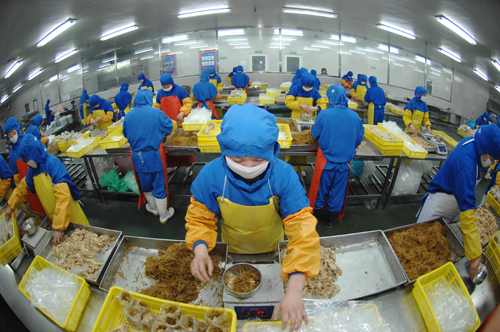|
 |
|
RELIEVING THE BURDEN: Employees of Shantai Food Co. Ltd. in Wendeng, Shandong Province, work on an assembly line. The government handed out generous incentives to support smaller businesses, including tax reductions (GUO XULEI) |
As part of its efforts to strengthen structural tax reduction, China continues to lower its import tariffs. As of January 1, 2012, average import tariffs for more than 730 product categories were set at 4.4 percent, barely half of the Most-Favored-Nation tariff treatment.
"China will continue to implement and improve the policy of structural tax reduction," said Xie Xuren, Minister of Finance, at the National Finance Conference on December 25, 2011.
As an important part of China's structural tax reduction campaign, lowering import tariffs could help increase imports of much-needed energy and resource products, advanced equipment and core components and parts.
Moreover, small and micro-sized enterprises will also benefit from the policy. Xie said the government will implement a string of measures, including raising the exemption threshold of value-added tax and business tax for small and micro-sized enterprises. The Ministry of Finance recently also announced it will halve the corporate income tax for small and micro-sized enterprises with annual revenue of less than 60,000 yuan ($9,479). According to the policy, effective between 2012 and 2015, the tax base of those firms will be cut by 50 percent while the tax rate remains 20 percent.
The country has been pressing ahead with reforms to its tax system. On January 1, 2012, China will launched a pilot program to replace the business tax with a value-added tax in the transport industry and some service sectors in Shanghai. The reform is a needed boon to eliminate repeated taxation on goods and services and alleviate financial burdens on companies.
In another move, the country will in 2012 make supportive business tax policies available for more logistics firms and support their storage construction with favorable tax policies on using urban land. Vegetable wholesale and retail businesses will be exempted from value-added tax.
"In the coming year, the country plans to deepen the resource tax reform and widen its coverage in a move to better support resource conservation and protect the environment," said Xie. "In addition, we will push forward the trial program of property tax and further improve the consumption tax system."
"Efforts will be made to adjust the coverage and rate of consumption tax so as to promote energy conservation and emission reduction and encourage rational consumption," he added.
The overall scale of China's structural tax reduction remains unclear. But in a recent report, the China International Capital Corp. Ltd. estimated that the pilot program of value-added tax reform in Shanghai could decrease the tax burden of affected industries by around 70 billion yuan ($11.1 billion).
While enterprises and residents are bound to benefit from tax reduction, concerns are growing about the impact on China's fiscal revenues. But Liu Shangxi, Deputy Director of the Research Institute for Fiscal Science under the Ministry of Finance, downplayed the worries.
"There is no need to worry about a possible slump in China's fiscal revenues since the tax reduction is only structural and limited in scale," he said.
"Moreover, the reform of resource tax, property tax and environmental protection tax are likely to increase tax revenues," added Liu.
| 